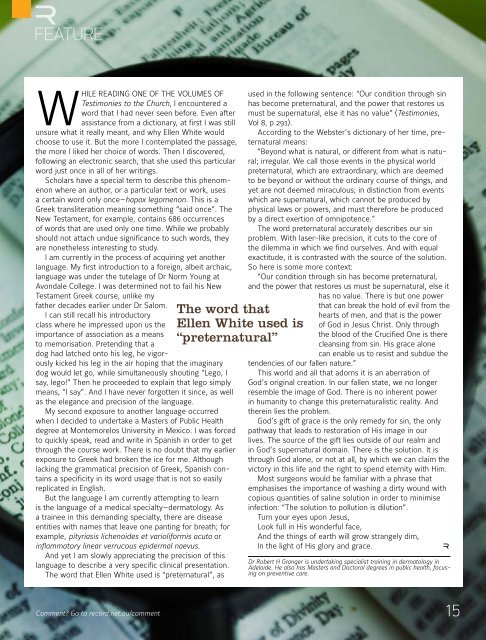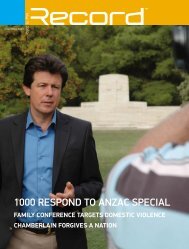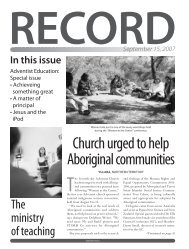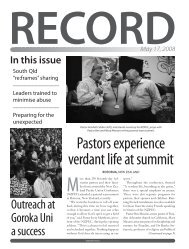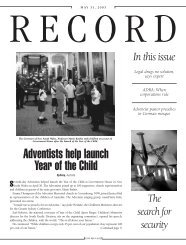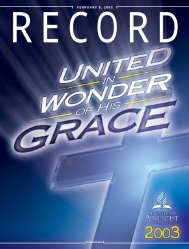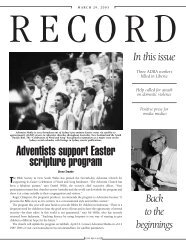Download the Record as a PDF - RECORD.net.au
Download the Record as a PDF - RECORD.net.au
Download the Record as a PDF - RECORD.net.au
Create successful ePaper yourself
Turn your PDF publications into a flip-book with our unique Google optimized e-Paper software.
FEATURE<br />
While reading one of <strong>the</strong> volumes of<br />
Testimonies to <strong>the</strong> Church, I encountered a<br />
word that I had never seen before. Even after<br />
<strong>as</strong>sistance from a dictionary, at first I w<strong>as</strong> still<br />
unsure what it really meant, and why Ellen White would<br />
choose to use it. But <strong>the</strong> more I contemplated <strong>the</strong> p<strong>as</strong>sage,<br />
<strong>the</strong> more I liked her choice of words. Then I discovered,<br />
following an electronic search, that she used this particular<br />
word just once in all of her writings.<br />
Scholars have a special term to describe this phenomenon<br />
where an <strong>au</strong>thor, or a particular text or work, uses<br />
a certain word only once—hapax legomenon. This is a<br />
Greek transliteration meaning something “said once”. The<br />
New Testament, for example, contains 686 occurrences<br />
of words that are used only one time. While we probably<br />
should not attach undue significance to such words, <strong>the</strong>y<br />
are none<strong>the</strong>less interesting to study.<br />
I am currently in <strong>the</strong> process of acquiring yet ano<strong>the</strong>r<br />
language. My first introduction to a foreign, albeit archaic,<br />
language w<strong>as</strong> under <strong>the</strong> tutelage of Dr Norm Young at<br />
Avondale College. I w<strong>as</strong> determined not to fail his New<br />
Testament Greek course, unlike my<br />
fa<strong>the</strong>r decades earlier under Dr Salom.<br />
I can still recall his introductory<br />
cl<strong>as</strong>s where he impressed upon us <strong>the</strong><br />
importance of <strong>as</strong>sociation <strong>as</strong> a means<br />
to memorisation. Pretending that a<br />
dog had latched onto his leg, he vigorously<br />
kicked his leg in <strong>the</strong> air hoping that <strong>the</strong> imaginary<br />
dog would let go, while simultaneously shouting “Lego, I<br />
say, lego!” Then he proceeded to explain that lego simply<br />
means, “I say”. And I have never forgotten it since, <strong>as</strong> well<br />
<strong>as</strong> <strong>the</strong> elegance and precision of <strong>the</strong> language.<br />
My second exposure to ano<strong>the</strong>r language occurred<br />
when I decided to undertake a M<strong>as</strong>ters of Public Health<br />
degree at Montemorelos University in Mexico. I w<strong>as</strong> forced<br />
to quickly speak, read and write in Spanish in order to get<br />
through <strong>the</strong> course work. There is no doubt that my earlier<br />
exposure to Greek had broken <strong>the</strong> ice for me. Although<br />
lacking <strong>the</strong> grammatical precision of Greek, Spanish contains<br />
a specificity in its word usage that is not so e<strong>as</strong>ily<br />
replicated in English.<br />
But <strong>the</strong> language I am currently attempting to learn<br />
is <strong>the</strong> language of a medical specialty—dermatology. As<br />
a trainee in this demanding specialty, <strong>the</strong>re are dise<strong>as</strong>e<br />
entities with names that leave one panting for breath; for<br />
example, pityri<strong>as</strong>is lichenoides et varioliformis acuta or<br />
inflammatory linear verrucous epidermal naevus.<br />
And yet I am slowly appreciating <strong>the</strong> precision of this<br />
language to describe a very specific clinical presentation.<br />
The word that Ellen White used is “preternatural”, <strong>as</strong><br />
The word that<br />
Ellen White used is<br />
“preternatural”<br />
used in <strong>the</strong> following sentence: “Our condition through sin<br />
h<strong>as</strong> become preternatural, and <strong>the</strong> power that restores us<br />
must be supernatural, else it h<strong>as</strong> no value” (Testimonies,<br />
Vol 8, p 291).<br />
According to <strong>the</strong> Webster’s dictionary of her time, preternatural<br />
means:<br />
“Beyond what is natural, or different from what is natural;<br />
irregular. We call those events in <strong>the</strong> physical world<br />
preternatural, which are extraordinary, which are deemed<br />
to be beyond or without <strong>the</strong> ordinary course of things, and<br />
yet are not deemed miraculous; in distinction from events<br />
which are supernatural, which cannot be produced by<br />
physical laws or powers, and must <strong>the</strong>refore be produced<br />
by a direct exertion of omnipotence.”<br />
The word preternatural accurately describes our sin<br />
problem. With l<strong>as</strong>er-like precision, it cuts to <strong>the</strong> core of<br />
<strong>the</strong> dilemma in which we find ourselves. And with equal<br />
exactitude, it is contr<strong>as</strong>ted with <strong>the</strong> source of <strong>the</strong> solution.<br />
So here is some more context:<br />
“Our condition through sin h<strong>as</strong> become preternatural,<br />
and <strong>the</strong> power that restores us must be supernatural, else it<br />
h<strong>as</strong> no value. There is but one power<br />
that can break <strong>the</strong> hold of evil from <strong>the</strong><br />
hearts of men, and that is <strong>the</strong> power<br />
of God in Jesus Christ. Only through<br />
<strong>the</strong> blood of <strong>the</strong> Crucified One is <strong>the</strong>re<br />
cleansing from sin. His grace alone<br />
can enable us to resist and subdue <strong>the</strong><br />
tendencies of our fallen nature.”<br />
This world and all that adorns it is an aberration of<br />
God’s original creation. In our fallen state, we no longer<br />
resemble <strong>the</strong> image of God. There is no inherent power<br />
in humanity to change this preternaturalistic reality. And<br />
<strong>the</strong>rein lies <strong>the</strong> problem.<br />
God’s gift of grace is <strong>the</strong> only remedy for sin, <strong>the</strong> only<br />
pathway that leads to restoration of His image in our<br />
lives. The source of <strong>the</strong> gift lies outside of our realm and<br />
in God’s supernatural domain. There is <strong>the</strong> solution. It is<br />
through God alone, or not at all, by which we can claim <strong>the</strong><br />
victory in this life and <strong>the</strong> right to spend eternity with Him.<br />
Most surgeons would be familiar with a phr<strong>as</strong>e that<br />
emph<strong>as</strong>ises <strong>the</strong> importance of w<strong>as</strong>hing a dirty wound with<br />
copious quantities of saline solution in order to minimise<br />
infection: “The solution to pollution is dilution”.<br />
Turn your eyes upon Jesus, <br />
Look full in His wonderful face, <br />
And <strong>the</strong> things of earth will grow strangely dim, <br />
In <strong>the</strong> light of His glory and grace.<br />
Dr Robert H Granger is undertaking specialist training in dermatology in<br />
Adelaide. He also h<strong>as</strong> M<strong>as</strong>ters and Doctoral degrees in public health, focusing<br />
on preventive care.<br />
Comment? Go to record.<strong>net</strong>.<strong>au</strong>/comment<br />
15


